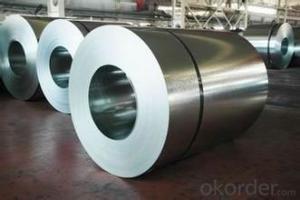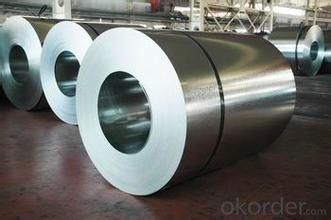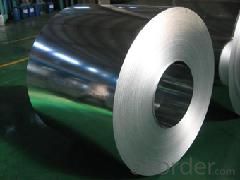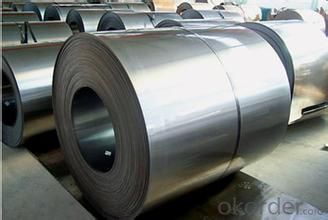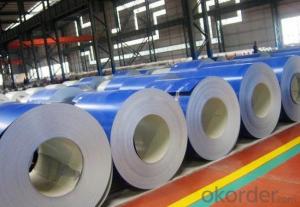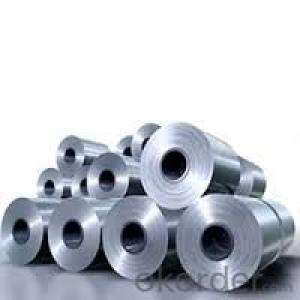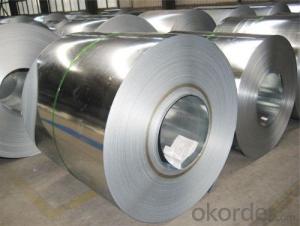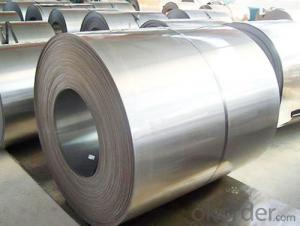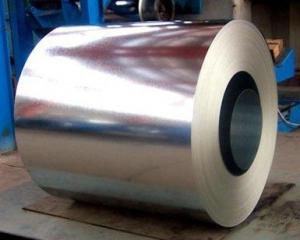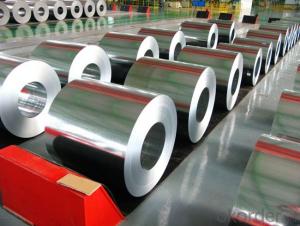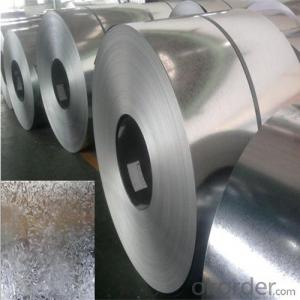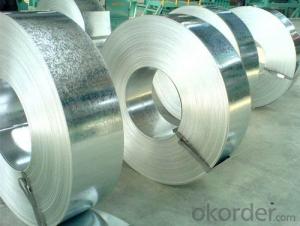Hot-Dip Galvanized Steel Coil of High Quality with Different Width
- Loading Port:
- Shanghai
- Payment Terms:
- TT OR LC
- Min Order Qty:
- 50 m.t.
- Supply Capability:
- 10000 m.t./month
OKorder Service Pledge
OKorder Financial Service
You Might Also Like
1. Hot-Dip Galvanized Steel Coil Description:
Hot-dip galvanized steel coil are available with a pure zinc coating through the hot-dip galvanizing process. It offers the economy, strength and formability of steel combined with the corrosion resistance of zinc. The hot-dip process is the process by which steel gets coated in layers of zinc to protect against rust. It is especially useful for countless outdoor and industrial application.
2.Main Features of the Hot-Dip Galvanized Steel Coil:
• Excellent process capability
• Smooth and flat surface
• Workability, durability
• Excellent heat resistance performance
• High strength
• Good formability
• Good visual effect
3.Hot-Dip Galvanized Steel Coil Images
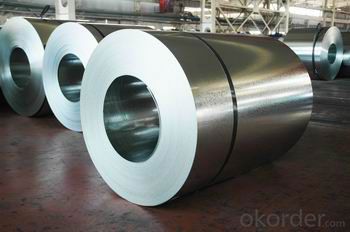
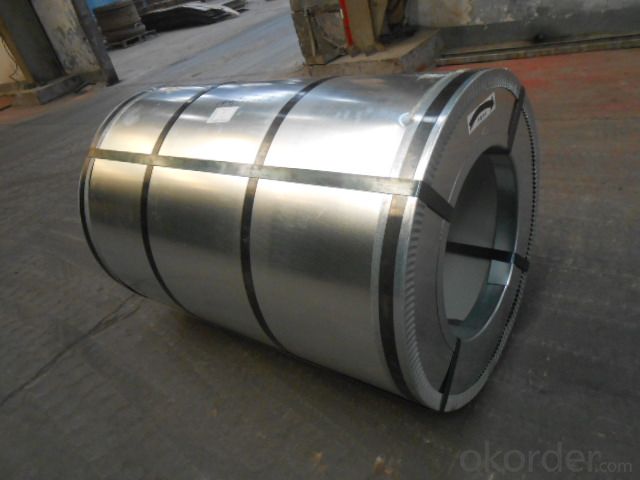
4.Hot-Dip Galvanized Steel Coil Specification
Standard: AISI, ASTM, BS, DIN, GB, JIS
Grade: SPCC, SPCD, Q195, DX51D
Thickness: 0.15-5.0mm
Type: Steel Coil
Surface Treatment: chromated, oiled, skin-pass
Application: Container Plate, panel sandwich
Special Use: High-strength Steel Plate
width: 600-1500mm
zinc coating: 50-275g/m2
coil weight: 3-7 tons
coil ID: 508/610mm
spangle: zero spangle, regular spangle, small spangle, big spangle
payment term: by L/C or T/T
5.FAQ of Hot-Dip Galvanized Steel Coil
1.What’s the application of this product?
There are many applications for this product. For example, roofing, cladding, decking, tiles, sandwich walls, etc.
2.Which payment term we can do?
L/C at sight or T/T.
3.Where is our factory?
Near by Tianjin and Shanghai.
4. What is the mininum quantity of every order?
50 tons.
- Q: How are steel coils used in the manufacturing of storage shelves?
- Steel coils are used in the manufacturing of storage shelves by being formed and shaped into the desired dimensions and designs. These coils are often cut, bent, and welded to create the frame and shelves of the storage unit. The strength and durability of steel make it an ideal material for supporting heavy loads and ensuring the longevity of the shelves.
- Q: What are the different steel coil surface treatments?
- Some of the different steel coil surface treatments include galvanizing, painting, powder coating, and oiled finishes.
- Q: why does steel have a density range when other metals do not?
- Steel is not a pure element it is an alloy. Steel is primarily iron but it has many elements blended in that change it's density including carbon,silicon, nickel, chrome, etc. Aluminum and copper , magnesium and so forth can be the pure element or they can be alloys too. If they are alloys, then their densities vary also
- Q: i wanna buy a sharp carbon steel sword the swords i want are a 200 layer carbon steel katana or a hand forged high carbon steel katanna or a hand sharpened sword which one would be sharper/stronger
- Is Carbon Steel Strong
- Q: What is the maximum width of steel coils?
- The maximum width of steel coils is subject to variation, influenced by factors like steel type, manufacturing capabilities, and intended usage. Nevertheless, in most cases, steel coils tend to have a maximum width of approximately 2,200 millimeters or 86.6 inches. This width is widely employed in the steel industry for coils of standard sizes. It is worth mentioning that wider widths may be achievable through specialized steel coils or custom manufacturing methods, albeit less frequently and possibly necessitating particular equipment or processes.
- Q: How do steel coils contribute to the energy infrastructure sector?
- The energy infrastructure sector heavily relies on steel coils, which are essential for constructing and maintaining various energy-related structures and equipment. To begin, steel coils are extensively employed in manufacturing pipelines, the lifelines of the energy industry. These pipelines transport oil, natural gas, and other energy resources across long distances, guaranteeing a consistent supply to power plants and other energy facilities. The use of steel coils in producing seamless and welded pipes ensures high strength, durability, and resistance to corrosion, making them well-suited for handling the challenging conditions of energy transportation. Apart from pipelines, steel coils are also used in the production of storage tanks for oil, natural gas, and other fuels. These tanks play a crucial role in storing large quantities of energy resources, ensuring an uninterrupted supply even during periods of high demand. By utilizing steel coils to fabricate the tank shells, the necessary strength and structural integrity are achieved, enabling them to withstand the pressure and environmental factors associated with energy storage. Moreover, steel coils play a vital role in the construction of power plants and other energy infrastructure facilities. They are utilized in manufacturing structural components like beams, columns, and supports, which provide the foundation and stability required for the safe operation of these facilities. Additionally, steel coils contribute to the production of equipment such as turbines, generators, and transformers, which are essential for converting energy into usable forms and distributing it to end-users. Furthermore, steel coils are employed in the construction of transmission towers and electrical grids. These structures and networks are responsible for transmitting electricity from power plants to residential, commercial, and industrial consumers. By using steel coils to manufacture the towers and poles that support high-voltage transmission lines, their stability and reliability in transmitting electricity over long distances are ensured. In conclusion, steel coils are irreplaceable in the energy infrastructure sector, providing the necessary materials for constructing, maintaining, and operating pipelines, storage tanks, power plants, transmission towers, and electrical grids. Their strength, durability, and resistance to corrosion make them the ideal choice for withstanding the demanding conditions of the energy industry, thereby ensuring a reliable and efficient energy supply to meet the growing needs of society.
- Q: How are steel coils protected during shipping?
- Various measures are implemented to safeguard steel coils during shipping, guaranteeing their safety and preventing any harm. One widely used technique is the utilization of steel coil cradles or saddles. These structures, specifically designed for this purpose, securely hold the coils in place and prevent any movement or rolling during transit. Typically made from robust steel or durable materials, the cradles are engineered to withstand the weight and pressure of the coils. Additionally, steel coils are often wrapped in protective materials like plastic or paper. This wrapping acts as a barrier, shielding the coils from potential contaminants such as moisture, dust, and other detrimental factors that could compromise their quality. The wrapping is applied tightly to ensure it remains in position throughout the entire shipping process. To provide further protection, specialized equipment is used to load the coils into shipping containers or onto flatbed trucks. Coil hooks or lifting clamps are examples of such equipment, allowing for safe and secure handling, thereby minimizing the risk of accidents or damage during the loading and unloading stages. In certain cases, steel coils may be packed into wooden or metal crates to offer additional safeguarding. These crates serve as an extra layer of security and prevent any potential impacts or rough handling from causing damage to the coils. Ensuring the protection of steel coils during shipping is of utmost importance to ensure their arrival at the intended destination in optimal condition. By employing cradles, protective wrapping, specialized equipment, and additional packaging when necessary, the risk of damage is significantly reduced, resulting in a smooth and successful transportation process.
- Q: Can steel coils be coated with epoxy?
- Yes, steel coils can be coated with epoxy. Epoxy coatings are commonly used to protect steel from corrosion and provide a durable finish.
- Q: What are the different types of steel coil surface protection methods?
- There are several types of steel coil surface protection methods, including oiling, painting, galvanizing, and plastic film coating.
- Q: What are the common coil storage conditions?
- The common coil storage conditions include keeping the coils in a dry and well-ventilated area, away from direct sunlight and extreme temperatures. It is also important to store the coils in an upright position, on pallets or racks, to prevent damage and ensure easy access for handling and transportation.
Send your message to us
Hot-Dip Galvanized Steel Coil of High Quality with Different Width
- Loading Port:
- Shanghai
- Payment Terms:
- TT OR LC
- Min Order Qty:
- 50 m.t.
- Supply Capability:
- 10000 m.t./month
OKorder Service Pledge
OKorder Financial Service
Similar products
Hot products
Hot Searches
Related keywords
